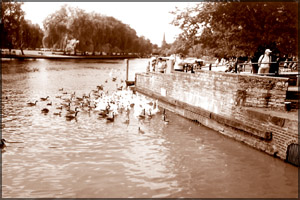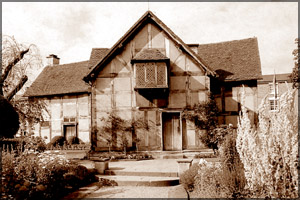Who was Shakespeare any way - part II
Gwen Heart
Continued from last week
Perhaps the most one can say about the scanty evidence available is
that there appeared to have been a most part of Shakespeare's life which
was very conventional by the standard of his background and time.

River Avon played a significant role in the life and works of
Shakespeare. The black and white swans inspired him as did the
slow rolling waters of the river. |

Shakespeare’s birthplace where dreams took wings and a clossus
was born. |
It is possible that this side contributed to the one feature of his
character that is generally attested to which is the sweetness of his
temper. But it was also bound by with a sense of carried by a business.
Yet, much of the burden produced Shakespeare's genius though he appeared
to have been burdened by his property and the continuance of his family
line which the troubled provision of his will sought but failed to
secure.
Setting aside the rumoured tales such as accusing Shakespeare's
alleged poaching from Sir Thomas Lucy's property as a young man and the
possibility of him having been a Roman Catholic (he was a devout
Anglican) little else is known of Shakespeare other than his writing.
Though highly regarded and respected during his lifetime, he never
had the kind of adulation that has been accorded since. No one cared to
keep his records like the way Boswell did to capture Dr. Johnson or for
that, if they did, it never came to light.
Outside his artistic works, Shakespeare a picture of a well-liked and
successful businessman. So, that leaves us with a scanty picture of
Shakespeare's private life as against his spectacular literary life.
Shakespeare was an established figure in London theatre by 1592.
Being an actor and playwright, he attracted envy of another writer,
Robert Greene.
So angry was Greene that he issued a pamphlet to his university
colleague and fellow graduates in the literary scene of their rights
were being encroached upon by a mere actor.
Greene warned his colleagues that the players were out to explicit
and replace them.
'Yes, trust them not for their is an upstart Crowe
beautified with feathers and that with his Tiger's
heart wraps in a player's hide'
Greene wrote this towards the end of 1592 and on his deathbed but
Shakespeare had made a name for himself by then.
Regardless of any humiliation, Shakespeare continued. In the
meantime, there were many writers such as Ben Jonson wrote for several
and different companies. The diaries of Phillip Henslowe, the
entrepreneur and theatrical impressario suggested the kind of frenzied
conditions under which great many works have been produced.
There were great many scripts written turnover that were written at
high speed and corroboratively. For Shakespeare's good luck, he enjoyed
an unusually and stable relationship with one company. He worked for
different companies in the early stages of his life and by 1594 he was
one of the leading members of the Lord Chamberlain's Men.
During Christmas, they performed at Courts and warren for payment
specifically names Richard Barbage, William Kemp and Shakespeare.
Barbage and Kemp were the leading comic actors of the company
respectively. Unlike actor-dramatist, Mollier, Shakespeare was never a
leading actor. It was fair to mention that it was his writing that won
him his status.
Possibly by 1594 and certainly by 1599 when the company moved to its
London base from the Theatre, North of the City down to the Globe, South
of the river. By doing so, he was able to rise the cash he required and
yet another reason because he had identified his own talent.
The company was renamed The King's Men in 1603 and remained with it
until James I brought it under royal patronage until the end of his
career. Here are records to indicate where he lived in London, ie. St.
Helen's, Bishops-gate near the Theatre in Shoredich and later in the
South of the river, probably near the Globe. He also lived at Silver
Street in 1612 because of a lawsuit with a Huguenor called Christopher
Mountjoy.
Shakespeare acted in plays other than in his own. The edition of
Johnson's Everyman in his humour and spirit had listed his name in the
cast. Around 1610 he stopped acting while his output as a writer slowed.
He spent more time at Stratford and in 1613 he retired.
He continued to make money from his investment in The King's Men.
Many historians believe that there are the bare bones of Shakespeare's
London life and the meat of it is to be sought in his works. It was
impossible to have traced the chronology of his output and its
development as a writer.
In 1930 a specialist of Shakespeare's work, E.K. Chambers reviewed
all the available evidence and generally his conclusions were accepted
until the editors of Oxford-Shakespeare, Stanley Wells and Gary Taylor
re-evaluated and were considered more in keeping than that of Chambers.
Stanley Well's remarks were possible to have been writing before his
plays were produced.
His earlier works showed great ambition and it is not certain that
the great English History plays before Shakespeare worked on its genre.
If he did not invent them, he made them his very own. That was
Shakespeare-confidence that carried him through in all his literary
genius.
Though he did not set out to write a textralogy, Shakespeare's first
period was dominated by the War of Roses. He finished writing Richard
III, he had created an extraordinary which bore a formidable impact upon
his contemporaries.
Those who were challenging his literary works, were slowing backing
down. His textralogy of Henry VI Parts, I, II and III and Richard III
ended with victory for the future Henry VII who was the reigning queen's
grandfather.
He had created such a tense atmosphere that the events caused a
spectacular implication of Shakespeare's own forbearers may have passed
down the personal recollections of the periods and grant a coat of arms
to John Shakespeare. It was recorded that his parents and late
grandfather were rewarded for their faithful and valiant services by the
most prudent prince, King Henry VII.
His other works during this period were more tentative and they were
his earliest experiments at comedy. The Two Gentlemen of Verona and The
Taming of the Shrew. They were followed by The Comedy of Errors and a
blood-churning horror-tragedy, Titus Andronicus.
Incidentally, this is the bloodiest tragedy I have read to date that
includes fiction as well as murders like Jack the ripper, for instance.
I never read more gory a murder like Titus Andronicus.
The artifice of these plays can make it difficult today although they
have been successfully produced in that century and need to be
interpreted more with ingenuity to retain their very essence as how
Shakespeare plotted them.
|

